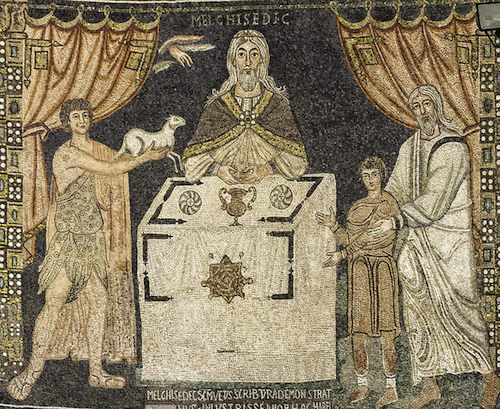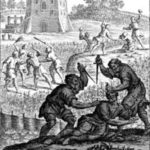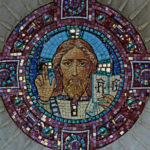We run our website the way we wished the whole internet worked: we provide high quality original content with no ads. We are funded solely by your direct support. Please consider supporting this project.

The Centrality of Christ in Hebrews, Part 2
The intensely Christocentric reading of the Old Testament that I introduced in the previous post is reflected throughout the book of Hebrews. Here I want to cite two more examples of how this writer saw Christ at the center of the OT.
Hebrews 7
Here the author argues for the superiority of Christ’s priesthood over the Levitical priesthood by noting that Abraham gave a tenth of his spoils to Melchizedek, king of Salem, and Melchizedek, in return, blessed him (Heb. 7:4, cf. Gen. 14:20). Since the biblical record never mentions the parents of Melchizedek, this author concludes he is a type of Christ, “[w]ithout father or mother, without genealogy, without beginning of days or end of life, resembling the Son of God, he remains a priest forever” (Heb 7:3). Four times this author applies to Christ a Psalm that celebrates David’s unending priestly role as king by saying his priesthood was “in the order of Melchizedek” (Ps. 110:4; cf Heb. 5:6, 10; 7: 17, 21).
Now, since the Levites are descendants of Abraham, this author concludes they were “in the loins” of Abraham when he paid tribute to Melchizedek and when Melchizedek blessed Abraham. Hence, this author concludes that the Levites themselves paid tribute to, and were blessed by, Melchizedek (7:9-10). And since the one who pays tribute to another thereby acknowledges the superiority of the one they pay tribute to, and since “without doubt the lesser is blessed by the greater” (7:7), it follows, in the mind of this author, that Christ is superior to the Levites.
While we are clearly dealing with some ancient interpretive strategies that are quite foreign to our modern way of thinking, it’s also the case that the way this author applies these strategies reflects the intensity of his Christocentric reading of the OT. As he surveys Scripture through the lens of Christ, this author discovers truths that no one would ever discern were they not reading through this lens.
Hebrews 10
Now let’s consider the creative use the author of Hebrews makes of Psalms 40:6-8. The author is in this case showing the superiority of Christ’s sacrifices over the sacrifices of the OT. He begins by quoting the Greek (Septuagint) version of verse 6. This is significant, because whereas the Hebrew text has the Psalmist saying, “my ears you have opened” [literally, “dug out”] (40:6), the Septuagint has “a body thou hast prepared me.” It’s not clear why the Greek translators made this alteration, though, on the assumption that they were not dealing with a now-lost textual variation, the best guess is that they understood “ears” to be an idiomatic expression for a person’s whole being.
In any event, the original passage expresses the Psalmists conviction that the Lord wants his whole being rather than his sacrifices. For the author of Hebrews, however, this passage has become nothing less than a declaration of the pre-existent Christ expressing his conviction that God had prepared a body for him because “with burnt offerings and sin offerings [God was] not pleased” (Heb. 10:5-6). The author then seems to bring together elements of both the Septuagint and Hebrew text as he has the pre-existent Christ say, “Then I said, ‘Here I am—it is written about me in the scroll—I have come to do your will, my God” (Heb. 10:7, cf. Ps 40:7-8). On this basis the author is able to proceed to demonstrate that Christ’s sacrificed body is the once-and-for-all sacrifice that God desires and that the new covenant has set aside the old one (Heb. 10:8-22).
This example once again illustrates the intensity with which early disciples combed through Scripture in light of the new revelation of God they’d received in Christ. As is true to some extent of all NT authors, the driving question behind this author’s approach to the Old Testament was, in the words of Richard Longnecker: “What do Scriptures mean when viewed from a Christocentric perspective?” (Biblical Exegesis in the Apostolic Period, 185). What passages might mean outside of this perspective—e.g. the exact meaning that the original author intended—was of little to no concern to them. For all who had eyes to see, the true meaning of Scripture is found in Christ.
While the specific interpretive strategies they use to unlock the way the OT bears witness to Christ are clearly culturally conditioned, the sheer fact that they read the OT in this intensely Christocentric way is clearly not. Indeed, given their understanding of Jesus as the embodied revelation of God who fulfills and supersedes all previous revelations, I submit that there really was no other way for them to read their Bible. Believing as they did all Scripture is “God-breathed” while also believing that Jesus alone reveals what God is really like, they had no choice but to search for ways of interpreting it so that it didn’t compete with Christ, but rather bore witness to him.
Photo credit: Lawrence OP via VisualHunt / CC BY-NC-ND
Category: General
Tags: Bible Interpretation, Christocentrism, Cruciform Theology, New Testament, Old Testament
Topics: Christology
Related Reading

From Boston, With Love
We posted some of T. C. Moore’s reflections on the Open 2013 conference earlier this week. T. C. lives in Boston and was deeply moved by the violence and terror that came to his city. Now we want to share his most recent blog post Oz and the Cross: Reflections on God’s Love and the…

The Violent Vineyard Owner: A Response to Paul Copan (#8)
In my previous post I addressed two of the three parables that Paul Copan argues present God in violent ways. Today I will address the third, which is the parable of a vineyard owner with hostile tenants (Matthew 21:33-41; Luke 20:9-13). This parable differs from the previous two parables. Whereas the previous parables deal with…

Revelation 13:8 refers to “everyone whose names have not been written before the foundation of the world in the book of life.” How does that square with open theism?
Three possibilities exist in terms of reconciling Revelation 13:8 with open theism. 1) First, the “from the foundation of the world” clause can attach to either “everyone whose names have not been written” or to “the lamb that was slain.” For example, the TNIV translates this passage “All inhabitants of the earth will worship the…

Does the Author of Hebrews Condone Capital Punishment? A Response to Paul Copan (#12)
In his critique of Crucifixion of the Warrior God (CWG), Paul Copan argues that several New Testament authors condone capital punishment as directly willed by God. The most challenging for my thesis, in my estimation, is Hebrews 10:26-29, which reads: For if we willfully persist in sin after having received the knowledge of the truth,…

Podcast: What Do We Do When the Bible Sends Mixed Messages?
Greg considers how to interpret mixed commands in the Bible—where one verse advises differently than another. http://traffic.libsyn.com/askgregboyd/Episode_0364.mp3

Jesus, the Word of God
“[T]he standing message of the Fathers to the Church Universal,” writes Georges Florovsky, was that “Christ Jesus is the Alpha and Omega of the Scriptures both the climax and the knot of the Bible.”[1] It was also unquestionably one of the most foundational theological assumptions of Luther and Calvin as well as other Reformers. Hence,…
